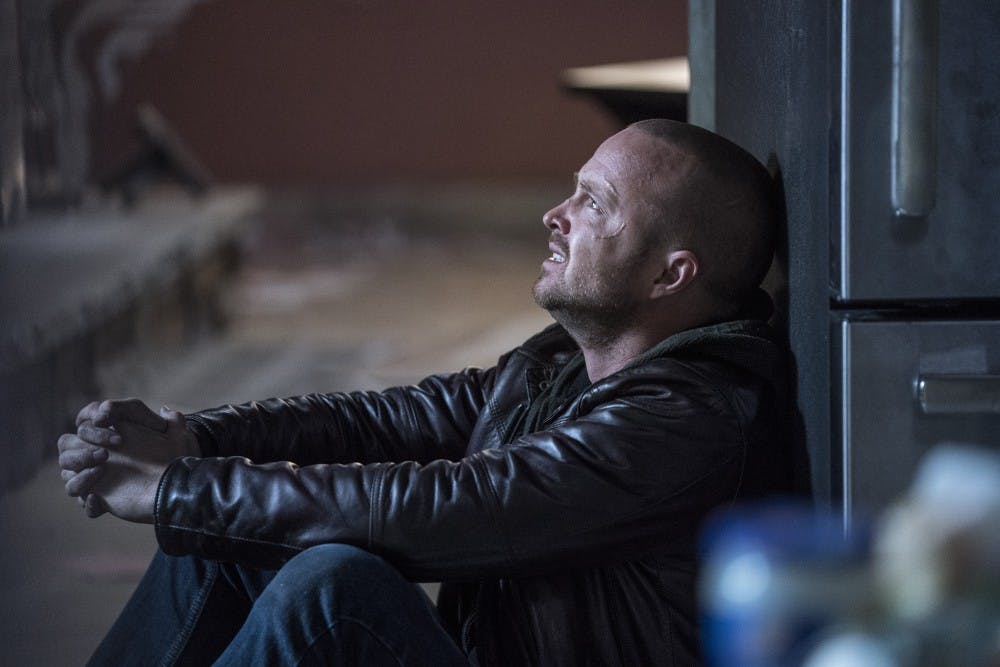Last November, actor Bryan Cranston sent the Breaking Bad fanbase into a frenzy when he announced that the show’s creators were working on a movie to bookend the franchise. The film, El Camino: A Breaking Bad Movie, was released on Netflix and in select theaters on Oct. 11 and takes viewers on a nostalgic journey through the past and present lives of Jesse Pinkman, played by Aaron Paul. So buckle up, because this ride is a crazy one.
The movie begins right where the television show left off: Jesse is driving to his freedom after Walter White’s death. The audience likely sympathizes with Jesse more than any other character in the series, and feels overjoyed that he has finally been liberated. Viewers have the sense that now, Jesse will be able to start anew.
In the moments following Jesse’s escape, news outlets pick up on the gunfight, and Jesse is portrayed by many as a perpetrator rather than the victim of incredibly abusive conditions. With law enforcement closing in on him, Jesse needs to find a way out, and fast. He needs money, closure, and—for the first time since he started doing business with White—Jesse needs peace.
The Breaking Bad show finished filming more than six years ago, and the final episode flawlessly combines both satisfying conclusions and open–ended questions. The mere existence of El Camino begs the question, why risk ruining such a perfect ending?
Of course, when any incredible show ends, viewers wish for more. However, even the biggest fans in the Breaking Bad community can respect the show’s conclusion and the writers’ choices to end it how they did. Perhaps, rather than being an epilogue, the movie is a character analysis of the world’s most beloved drug dealer, Jesse Pinkman.

The film features cameos from some of the franchise’s most adored and most despised characters. Flashbacks feature Mike, Jane, and Todd—characters who had substantial influence on Jesse’s life, but died at some point during the show’s five seasons. In the present, Jesse begs his close friends Badger and Skinny Pete for help after his escape. Such appearances remind audiences of the show’s most heated conflicts and heart–breaking moments.
And, of course, no Breaking Bad movie would feel complete without the man behind the entire meth empire, Walter White himself. Actor Bryan Cranston appears near the end of the film in a flashback, where he and Jesse are eating breakfast in a diner. The scene encourages audience members to empathize with Jesse, whose caring attributes shine in the scene, but are absent throughout the movie.
As expected, Aaron Paul’s acting does not disappoint. The 40–year–old plays 23–year–old Jesse Pinkman flawlessly, even six years later. Jesse makes frustrating and poor decisions at every corner, but still, Paul’s performance allows the audience to sympathize for Jesse.

The biggest issue with El Camino is its predictability. Nothing is particularly surprising; in fact, most of Jesse’s decisions were made by other characters during the show itself. The writing is strong, but it struggles to compensate for the plot’s lack of originality. While each of the show’s 62 episodes were action packed, much of the film teeters on boredom. This is certainly the movie’s most disappointing quality.
El Camino is hardly a feel–good movie. It’s depressing, it’s raw, and at times it’s even hard to watch. It's definitely not a first date or wine night film. However, despite the controversy surrounding series’s ending, all Breaking Bad fans deserve to see Jesse Pinkman in action just one more time—and El Camino gives us just that.







